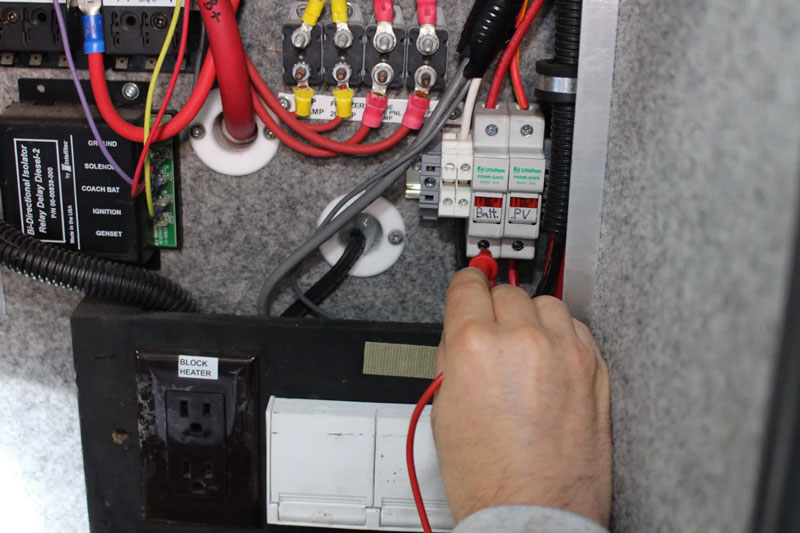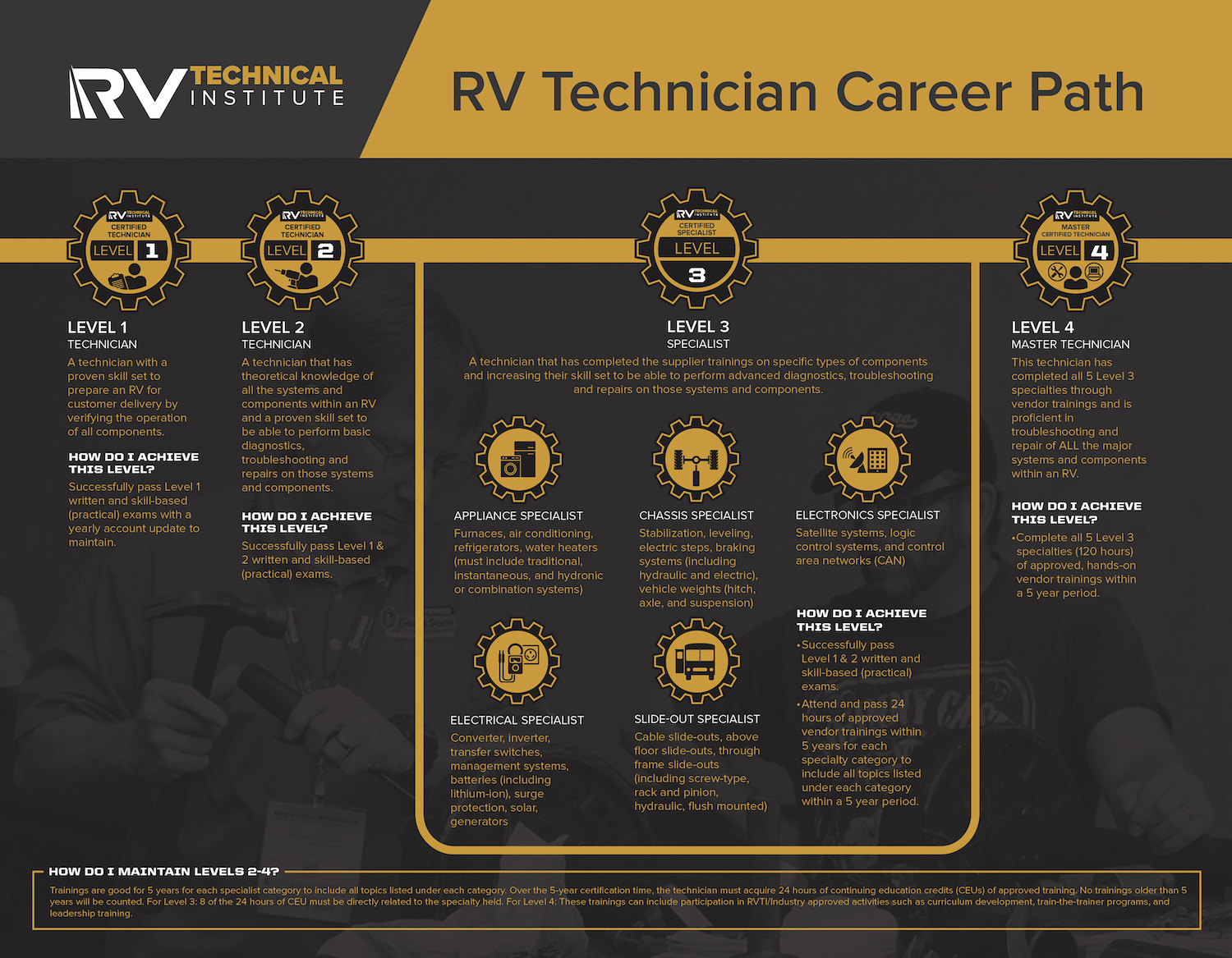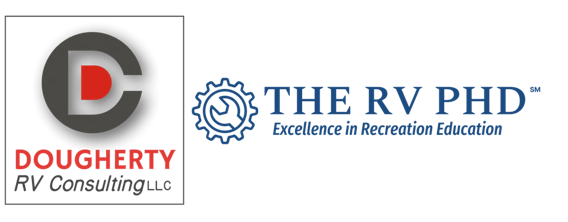
I met a dealership employee who turns wrenches on RVs some time ago who told me about how he has many years in the business, is self-taught, and doesn’t have time for this “training crap.” It’s all about getting billable hours, he told me. Among the dealers he worked for was a company that emphasized that every new RV must have 45 hours of billable warranty during the PDI, and everything he does is with that focus in mind. All the while, I am watching him screwing up on an RV. His “resume” read like a CVS pharmacy receipt, with little doubt that the list would get longer.
I once talked to a dealership principal who was schooling me on what a waste of time the certification program is. He said he hired one certified tech once and fired him because he was too slow. He went on to say that he wants to train people his way. An example was when a customer came in with a broken water heater; he wanted his “tech” to change the board and ship it. He said that if the customer returns, we’ll do something else—billable hours.
I have been in this business a long time, and I understand the business side of things. Every business has a push-and-pull about how to do things right while counting beans. It has to happen. Many people go to work only because they have to, and their concentration is “stackin’ cheese,” as they say. In my experience, this seems to be a typical attitude of non-skilled workers, with tasks being transactional instead of additive and cumulative.
I once had an unsuccessful student who wanted nothing to do with the RVTI training, stating that he “wanted to get back [to the dealership] and fix units.” Others have told me that they didn’t need to learn the content, that they were used to having someone show them a task, and they did that task, like on Henry Ford’s assembly line. “Show me this, and I do this,” he said. “I don’t need to know the rest of it.”
Many years ago, I asked a service writer at a store where I worked what he thought RV techs were. “Parts changers,” he said sarcastically.
All the while, RV consumers are becoming increasingly frustrated with the RV ownership and use experience. During the 2024 RV Industry Power Breakfast, KOA CEO Toby O’Rourke stated that RV owners were looking for alternate ways to enjoy outdoor experiences, including hotels, suggesting that many want to eliminate the hassles of RV ownership. To the point, KOA is opening their first hotel on a campground. Camping World CEO Marcus Lemonis, also at the breakfast, said, “We need to make better units.” Searching social media, YouTube, and other online forums and publications, it’s clear that RV problems are a constant source of angst; many problems, like frame issues and leaks, end the RVing journey for many when they least expect it.
I want to address several points here and discuss how certification can fix them.
Attitude and the Facts of Life
This author is not (entirely) naive. While we’d all like to live like Disney’s Seven Dwarfs, whistling “Hi-Ho” while off to work we go, the reality is somewhat different, especially with unskilled labor jobs. When an employee is or feels unappreciated or abused, work is transactional and more unpleasant. However, workers can feel more engaged when there is support from the organization and fellow employees.
Therefore, attitude and culture affect operational productivity.
There are many honorable jobs out there, but it is hard to add any es·prit de corps to some jobs. Even so, sometimes it is done. For instance, the New York City Sanitation workers have an Emerald Society that marches in the NYC St.Patrick’s Day Parade. They have a dress uniform, not unlike firefighters, EMS, and law enforcement workers. There are many examples out there.
Developing an attitude that RV technicians hold a special place in the dealership and the RV world can make a big difference. The certification program can increase a tech’s pay and be a source of pride for them if they’re looked up to.
Part of this is that being an RV tech is a step up in their career. Not everyone can be a successful RV technician. Those hired as entry-level employees may not progress beyond basic tasks, and that’s OK. Those tasks need to be done. But suppose someone shows the ability and initiative and is willing to learn the correct way to do the job. In that case, they should be given the opportunity, understanding that if they don’t progress, they may be demoted back to their old position if it is still available.
There is a reason we appreciate uniforms, banners, signage, and flags as a society. They show what tribe we belong to. Seth Godin has long lectured about tribalism in society and its tie to marketing. This can be a powerful incentive in the service shop and other departments in the dealership.
Apple is a perfect example of how uniforms can set the tone for an organization. At the most basic level, Apple stores have two uniforms: blue t-shirts for spring, summer, and fall, and red for the holidays. Even managers wear them. But if you’re a permanent team member, you can add black jackets, hats, and sweaters, all with the Apple logo, to your uniform. Otherwise, what you wear is whatever you feel is fashionable, within reason. (The latest fancy sneakers were the fashion statement at my local store!)
Make sure that your techs know how much they are appreciated. Maybe their bay gets a sign when they become certified or better? Perhaps they get a uniform change? A patch change? Maybe their pic goes with their certificates on the wall where all the customers can see it? Unique clothing to reflect their status in the career? There are lots of options.
The most important, however, is instituting a variable pay scale. Whether your shop works hourly or flat rate, technicians should have higher pay for higher qualifications and responsibilities. A further benefit to them is that they will be doing more of what they want to do…being a tech, as other unskilled workers will do some of the grunt work, like moving units and cleaning up the shop. Ideally, a high-level tech will punch off one job and have a unit in another bay awaiting their expertise and can immediately punch in on that one. That’s a tricky dance to accomplish and takes a lot of willingness on the part of the whole team, but it can be an exciting goal.

Education and Training
The way we learn varies, to some extent, on the individual. As someone who grew up with a learning disability, which was “new” in the 1980s, typical school work was challenging and a drag. This has haunted me my whole life. Memorizing is tough for me. Remembering things as simple to most folks as learning a name takes me much longer. Even though I attended college, I left half way through for a career in fire and EMS instead of the communications field I went for. Of course, I have worked in that field since, but I found my skills and interests were elsewhere.
So, yes, I, too, am a hands-on guy.
I differ from some because I see the benefit of foundational learning in any job. When I first joined the fire service as a rural volunteer, I had no training until I went to college and volunteered there. There was state fire training, and we were a combination paid/volunteer department, so the goalposts were far higher regarding whether you could function respectably in that atmosphere. When I got hired, I attended basic training in Westchester County and New York City, again raising the stakes even higher. It was quite an experience for a farm kid from upstate!
The point is this: functioning in that business requires training and education to be effective and safe. At one time, it may have been more about watching, doing, and learning, but no more.
Waterford Crystal is the absolute standard for crystal design manufacturing. On a visit to Waterford in Ireland, I learned what it takes to make their beautiful products. You can’t go to school to learn it. The basic apprenticeship is eight years before you can create your own pieces; a master cutter is there for at least 18 years before earning that title. The difference is that Waterford Crystal has been in business since 1783, and they do one thing: as much artistry as mechanical science. So, paying someone for eight years before they can be “on their own” is the cost of doing business. That’s why Waterford Crystal is expensive.
A foundational education gives a person a starting point from which they can become familiar with the basic precepts of their vocation. Without this, a person who has never been exposed to the task is set up for failure right from the beginning.
Experience plays a big part in how any person develops personally and professionally, but poor experience can be detrimental in our complex world.
Ideally, every employee in any work setting, including an RV business, would have a combination of training and apprenticeship to learn how to do the job, with additional learning opportunities along the way. The more initiative the employee shows, the more job responsibilities they get and the more learning opportunities they can access.
The RVTI technician training program has been designed to fit this paradigm. A new technician spends a week in class learning basics that get them acclimated with our industry and its products. After that, working with others in the shop and doing pre-delivery inspections gives them hands-on access to every type of RV. Later, if they show promise and ability in troubleshooting and repair, they can continue their RVTI training and then get trained in the various systems found in RVs. As the years pass, the most proficient can attain their level four or master’s certification. The certification, like being part of a team, being in a military unit, or being in public service, is an achievement that not everyone rises to and should be celebrated.

The Marketing and Consumer Benefits of Certification
Another reason the certification programs are essential is their effect on marketing and end-user satisfaction in the industry.
Let’s take a minute to consider the end-user. RVers spend what is to them a lot of money on an RV, whether it be a $15,000 pop-up camper or a $1.5 million motor coach. For many, it can be the biggest purchase of their lives, as RVs can be more expensive than many homes.
For RVing families that are balancing their RV vacations with work and school, RV time is well scheduled, sometimes a year in advance. Imagine how that customer feels about a problematic RV that is out of service for months or breaks down at the beginning of that vacation. At the same time, other folks who are not under that time pressure but still have plans with their RV or those who “live” in the RV full-time end up severely inconvenienced or worse. If they know that an RV service facility employs – and I say this sincerely- only certified employees, aren’t they more likely to go there for sales and service than one of the examples cited earlier?
If the RV service center’s staff (service, parts, F&I, etc.) is trained and certified, and that training is maintained, here’s what will happen:
- The certification program is a great marketing tool that will bring customers to your door. RVers need service professionals who can keep them on the road, camping, and enjoying their purchase.
- The business will run more efficiently and profitably. When people know their jobs, products, and industry, work becomes more straightforward and less frustrating. The training programs not only teach techs, for instance, how to fix a system but also how to access resources to help them correctly diagnose and fix a problem. No one can remember everything, but if they can quickly and easily access technical information and industry experts who can help, the problem gets fixed faster and more accurately. This results in more turns and higher customer satisfaction.
- If you have a good shop, good techs, a good culture, and good support of the employees, which includes training, great employees will come to you. The word gets out. Granted, only some areas of the country are flush with techs, but interested employees who feel they can enjoy a career in the RV industry and make a difference will show up.
The Cost Benefit Analysis
Only some business owners want to grow their business. They already have all the service work they can handle. Maybe they can’t grow the business physically or don’t have or want to invest the dollars in expanding the service department.
The thing is this: if you want to sell RVs, you have to support them for all the reasons stated in this article. If you want to discourage more service customers, raise your prices. That way, it’s a market problem.
If we fail at supporting RVers properly, they’ll go elsewhere. I’m not just talking about other dealers, by the way. I’m talking about our real competition: hotels, resorts, cruises, airlines, and international travel companies… because people in the RV space are spending their hard-earned disposable income to use their RV for recreational travel. If we make it too much of a pain in the ass, and I would argue we have, then it encourages them to spend those dollars elsewhere. During the pandemic, for instance, Carnival Corporation scrapped many relatively new ships, as did others, and began new, over-the-top builds to bring everyone back to cruising.
We often forget that we’re in the travel and tourism business, not the used car business. So, shouldn’t we want to have a goal for our customers to have a smile on their faces all the time? What can we do to go in that direction?
For me, the cost-benefit analysis is easy. How can we not afford to move our fixed-base operations in a new direction? Certification and training are major steps in having happier customers who will come back time and again. An old boss once told me we needed to “Keep our current customers and bring new ones in.” That can be a marketing statement or a foundational practice.
I prefer strong foundations.
